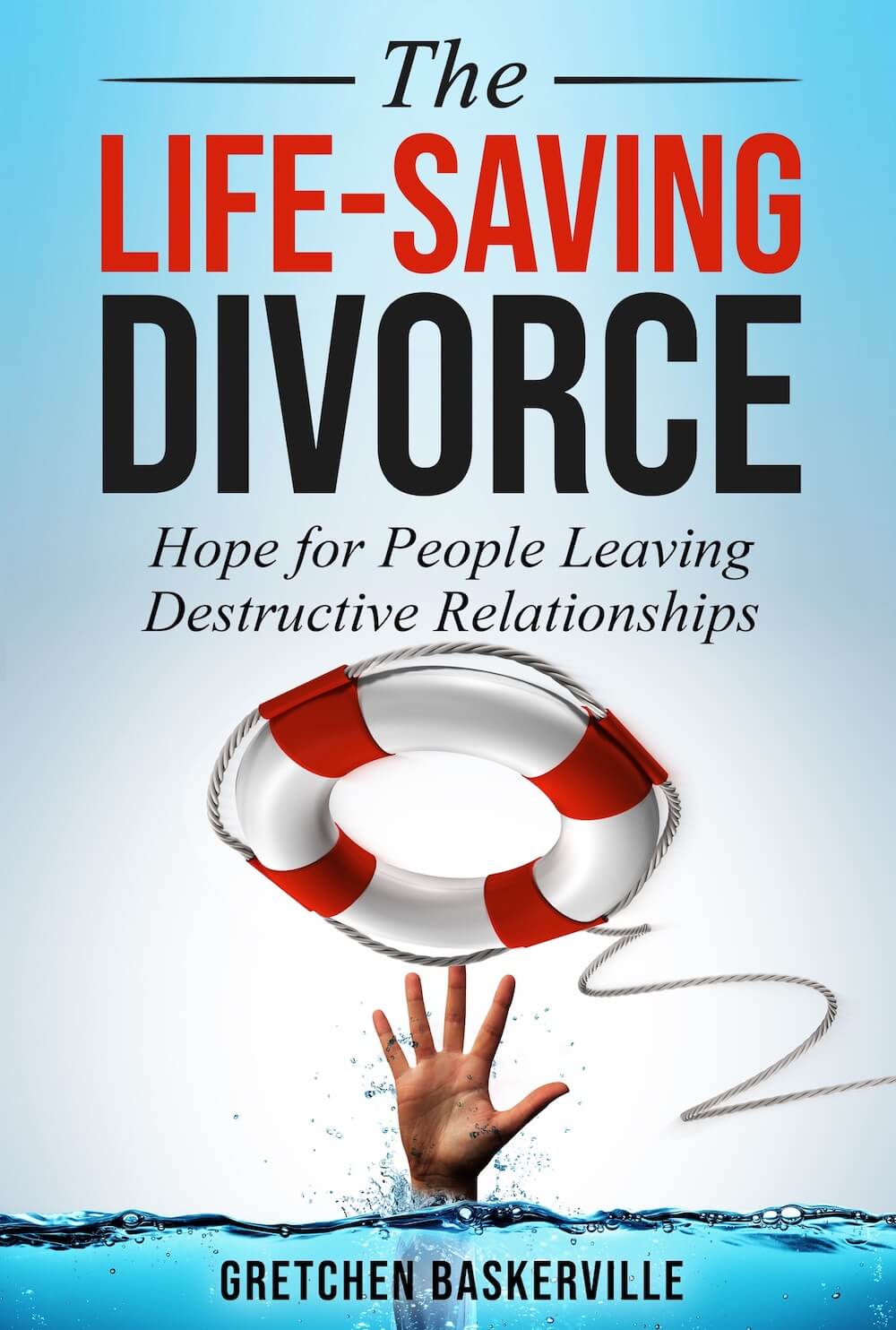A life-saving divorce is a divorce for serious reasons. It’s the opposite of a frivolous divorce. It is not an “I’m bored” divorce, or an “I feel unfulfilled” divorce, or an “I miss the party life” divorce.
What? Nearly half of divorces? That’s not what I was told!
Hey, I hear you. If you’re skeptical, I understand. I was shocked to discover this. I’ve attended church from the day I was born. I’m a devout Christian, brought up by loving committed Christian parents who have been married 60 years and counting. I worked in Christian organizations nearly all my adult life. No one ever told me this. In fact, my pastors and the Christian authors/websites I read always gave me the impression that 95% of divorces were for falling out of love. They told me most divorcees were people who were quitters and wanted to take the easy way out. They said divorcees were people who just didn’t have the determination to go the distance like everyone else. They suggested that divorcees didn’t believe in the sanctity of marriage and just told themselves “the grass is greener” if they could just find a different spouse.
My quest to find these answers started when my church asked me and another divorcee to start a small group Bible study for single mothers. The Christian women in our group had the same questions we did. How could we have gotten into such bad marriages? Were we just incredibly rare? Was God punishing us for some reason? Or are terrible marriages more common than we thought?
Destructive marriages are more common than we thought.
We weren’t alone. For decades family researchers have wondered the same thing. Why do people divorce? They’ve done a lot of surveys of divorced men and woman who reported anonymously.
Here are the four significant surveys.
Survey 1 – In this first survey, the participants had divorced over age 40. Of these, 50% of divorcees mentioned the most significant reason was one of the serious reasons: adultery, sexual immorality, domestic violence, chronic emotional abuse, or abandonment (neglect of duty). [1]
Survey 2 – In this survey of participants age 20- 55, about 42% of divorcees mentioned at least one of the reasons above as the issue that caused the divorce. [2]
Survey 3 – In this study, divorcees could select more than one major contributor to their divorce: 58% of divorcees mentioned infidelity; 30% mentioned domestic violence. (They did not offer drug/alcohol abuse as a choice.) [3]
Survey 4 – In this study, too, participants could select more than one factor in their divorce. Infidelity was a major contributor in 59.6% of divorces, substance abuse in 34.6%, and domestic violence in 23.5%. When asked for the “final straw,” nearly 6 in 10 mentioned either infidelity, domestic violence, or substance abuse. [4]
Nearly half of divorces are for life-saving reasons.
What this shows is that somewhere between 42% and 59% of divorces are for serious problems. So about half of divorces.
For a long time, we in the church have tended to think about divorce, and about people who have gotten divorced, as though only five percent of those divorces happened for good reason. As you can see from these studies, that’s not true.
There is a lot of bad behavior that makes marriages miserable: unfaithfulness, physical or mental abuse, drug or alcohol abuse, refusing to support the family, or simply walking out the door and never returning.
When the desperate spouse says, “I can’t take any more suffering and betrayal,” we call it a “life-saving” divorce. And only that desperate spouse knows how much they can take. No one else has skin in the game, not the pastor, not their parents, not their friends or people at church.
Those who taught us that 95% of divorces are “frivolous” are simply wrong.
Nearly half of divorces are life-saving divorces.
Footnotes:
[1] Xenia P. Montenegro, “The Divorce Experience: A Study of Divorce at Midlife and Beyond,” AARP the Magazine (May 2004), accessed 1/10/20, https://assets.aarp.org/rgcenter/general/divorce.pdf.
[2] Paul R. Amato and Denise Previti, “People’s Reasons for Divorcing,” Journal of Family Issues 24, no. 5 (July 2003): 602-626.
[3] C. Johnson, S. Stanley, and N. Glenn, et al., “Marriage in Oklahoma: 2001 Oklahoma Baseline Statewide Survey,” (2002): 15.
[4] Shelby B. Scott, Galena K. Rhoades, and Scott M. Stanley, et al., “Reasons for Divorce and Recollections of Premarital Intervention: Implications for Improving Relationship Education,” Couple and Family Psychology: Research and Practice 2, no. 2. (2003): 131-145.
- What is a Life-Saving Divorce? How Do We Know Half of Divorces are “Life-Saving”? (or watch the video)
- Life-Saving Divorce: Introduction What Is this Book About? (audio and transcript)
- About Me: Why Is a Nice Christian Girl Like Me Promoting Divorce?
- How Can I Get the Book, The Life-Saving Divorce? (Amazon affiliate link.)
- Help! I Am Alone with the Abuser
- Abuse is Biblical Grounds for Divorce
- “But He Never Hit Me”: Divorce for Neglect, Emotional, and Financial Abuse
- Pastors Who Accept Physical and Emotional Abuse as Grounds for Divorce
- Severe Emotional Neglect: Toni’s Story of Finding Freedom (video)
- 40 Years of Murderous Rages and How I Got Free! Karen’s story (video)
- How Churches Should Handle Abuse Victims (video with Pastor Neil Schori)
- Help! I’m Married to a Cheater: Should I Stay or Go?
- Married to a Pedophile: How I Got Out – Pam’s Story (video)
- Jesus’ Greatest Divorce Sermon – Luke 13 (or watch the Video)
- Pastors Who Accept Physical and Emotional Abuse as Grounds for Divorce
- Myth: The Person Who Files for Divorce Caused the Divorce
- Jesus Said, “Love My Enemy”-Can I Still Divorce Them?
- But I Thought it Was God’s Will for Me to Marry this Person!
- Is Pointing Out Marriage-Endangering Sin Being Judgmental? (video)
- One Woman’s Story: Adultery, Prayer and the Bible
- Is Marriage an Unconditional Covenant or a Conditional One? (Video)
- Does Divorce Shatter the Image of Christ and the Church as John Piper Suggests?
- Divorce and the Good Samaritan Story
- Myth: Divorce is the Unpardonable Sin and “God Hates Divorce”
- Myth: Your Divorce Will Shatter the Image of Christ and the Church
- Myth: You Must Forgive and Forget Over and Over, Forever
How to Find a Good Supportive Church
- Pastors Who Accept Physical and Emotional Abuse as Grounds for Divorce
- 7 Ways to Know if a Church is Safe for Abused Wives (or Abused Husbands)
- Do My Pastors Have a Say about Me Getting a Divorce?
- Good vs. Bad Pastoral Counselors on the Topic of Marital Abuse: 40 People Tell their Stories
- 1 Million God-honoring Divorcees Cannot Find a Good Church
- Church Denominations and Divorce Policies Comparison Chart
- Excommunication for Getting Divorced? What to Do!
- Evangelicals Shooting their Own Wounded Divorcees (video) or blog/transcript
- How to Handle Criticism When You Divorce (video-3 parts) Natalie Hoffman, Gina Kaye
- Myth: You Don’t Take God-Ordained Marriage Seriously
- Sermon Ideas for Domestic Violence Awareness Month – October
- Churches That Block Abused Wives (and Husbands) From Divorcing
- Southern Baptists make Evangelicalism Unsafe for Abused Wives & Husbands
- How Churches Should Handle Abuse Victims (video with Pastor Neil Schori)
- Your Kids Will Likely Be Fine After Divorce (Nearly 8 in 10 Are!)
- 10 Facts Evangelical Pastors MUST Know about Kids and Divorce [VIDEO]
- There Is No Divorce Crisis. We have a Sin Crisis.
- Myth: 95% of Divorces are for Falling Out of Love
- Will I Ever Find Love Again?
- Dating after Divorce: An interview with Gina Kaye
- I Fear I’ll Never Find a Healthy Relationship
- Remarriage after Divorce: How Can I Claim to be the Innocent Spouse? I Had My Faults Too!
- Will the Kids and I Ever Be Happy Again?
- Happiness Either Way: Remarriage or Staying Single
- Divorce May Improve Your Health: Depression, Suicidal Thoughts and Medical Issues
- How My Health Improved Dramatically After Divorce: Karen’s Story (video)
- “I’m Off of All My Depression Medications Now That I’ve Divorced” Schari’s story (video)
- PTSD, EMDR and My Major Health Improvements after Divorce Toni’s story (video)
- Christians Finding Peace after Divorce: Shirley Fessel, Author (Audio) or (Video)
- 10 Turning Points: Stories of How Others Decided to Stay or to Go
- Married to a Pedophile: How My Kids and I Got Free! (video)
- Finding Joy after a 40-Year Abusive Marriage (video)
- Can I Divorce My Mentally Ill, Destructive Spouse? Yes! Amanda’s Story (video)
- From Bondage to Glorifying God! 5 Survivor Stories (after 20-, 30-, 40-year long abusive marriages)
Self-Doubt, Second-Guessing Ourselves, and Gaslighting
- Am I the One Destroying the Relationship?
- How Can I Call Myself the Innocent Spouse? I Wasn’t Perfect Either (video)
- Is Pointing Out Marriage-Endangering Sin Being Judgmental? (video)
- Myth: He Wouldn’t Cheat or Watch Porn if You Gave Him More Sex
- Myth: You’re Lying: We’d All Know If Your Spouse Was That Bad
- Myth: It Takes “Two to Tango” and “All Marriage Problems are 50/50”
- How to Handle Criticism When You Divorce (video-3 parts) Natalie Hoffman, Gina Kaye
- Is it Best to “Stay for the Kids”? Sometimes, yes. But Not if It’s a Toxic Marriage
- Researchers Know Your Kids Will Likely Be Fine After Life-Saving Divorce
- 5 Studies That Say Your Kids are Likely to Be Okay After Divorce (video)
- Marriage Does Not Guarantee Good Kids: 1 in 10 Kids from Married Two-Parent Homes are Troubled.
- Myth 21: Divorce will Destroy Your Children, So Stay for the Sake of Your Kids
- Research shows: Your Kids Will Likely Be Fine After Divorce: In Fact It’s Best to Divorce to Get Away From Abuse
- 12 Ways to Document and Protect Yourself in a High-Conflict Divorce
- 12 Tips for Talking with Angry, Alienated Kids
- Myth: Divorce will Destroy Your Children, So Stay for the Sake of Your Kids
- Myth: Your Marriage Would Be Great if You Just Submitted More
- Myth: Divorce will Destroy Your Children, So Stay for the Sake of Your Kids
- Myth: Divorce is the Unpardonable Sin and “God Hates Divorce”
- Myth: You Just Didn’t Try Hard Enough
- Myth: You Don’t Take God-Ordained Marriage Seriously
- Myth: Your Divorce Will Shatter the Image of Christ and the Church
- Myth: You Must Forgive and Forget Over and Over, Forever
- Myth: 95% of Divorces are for Falling Out of Love
- 27 Myths about Divorce That Probably Don’t Apply to Committed Christians
- Download “7 Effective Ways to End the Stigma of Divorce in the Church” (Sign up)
- Download “7 Effective Ways to Deal with Criticism when You Divorce” (Sign up)
- Download “3 Studies that Show Kids Are Most Likely to Turn Out Fine After Divorce” (Sign up at bottom of page)
- Home Follow me on Facebook • Follow me on Twitter • Buy the book.
- 10 Key Highlights from the The Life-Saving Divorcebook: 10-minute video overview OR 10 Key highlights blog post
- Request to Join the Life-Saving Divorce Private Facebook Group (Don’t forget to answer the 3 questions)
- Subscribe (FREE) to my You Tube Channel
- About Me Contact
- Gretchen’s Life-Saving Divorce Interviews in the Media
- Examples of 150 examples of types of abuse (physical, emotional, spiritual, sexual, financial, and neglect) and explaining the term “gaslighting,” along with many first-person stories, read Chapter 4 in TheLife-Saving Divorce.
Here are the links to the Life-Saving Divorce book: (As an Amazon Associate I earn from qualifying purchases.)
Sign up for the Life-Saving Divorce email list. You can unsubscribe any time.



 :
:
 Buy PDF
Buy PDF